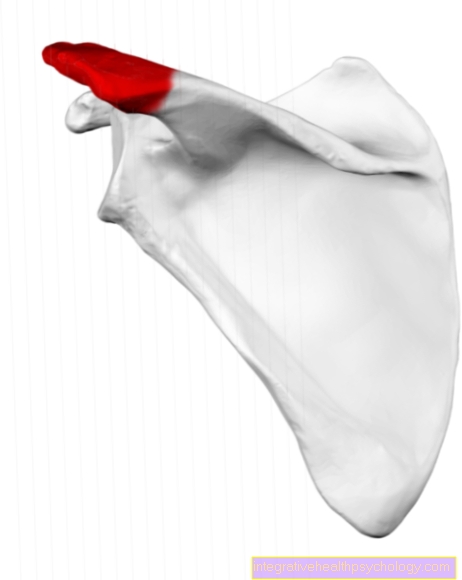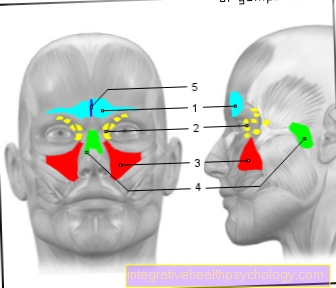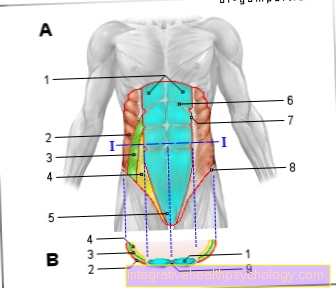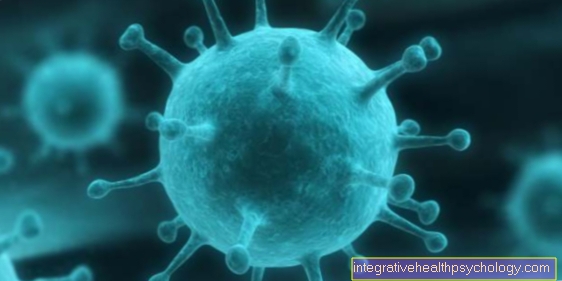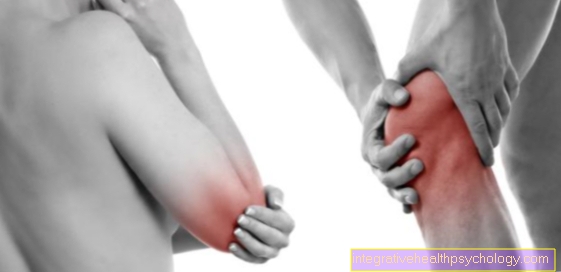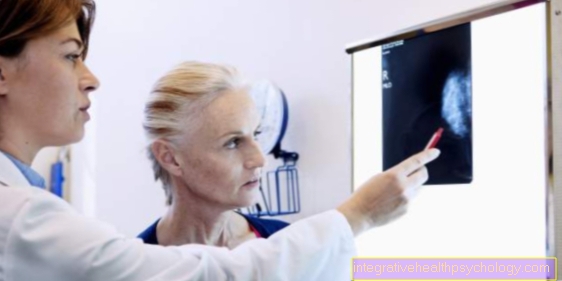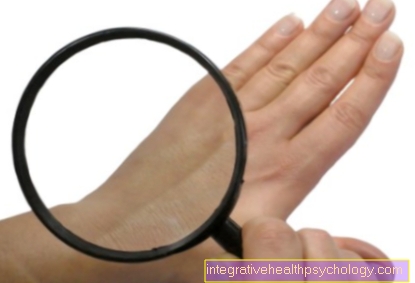Pregnancy Complications - What Are The Signs?
Signs and symptoms
In most cases, pregnancies go smoothly with no major complications. However, there are various risk factors and diseases that can cause complications for both mother and child during pregnancy. Risk factors can arise from both the anamnese (Previous / medical history), as well as the examination the expectant mother or during the entire pregnancy. However, pregnancy complications can also arise suddenly and without previously known risk factors.
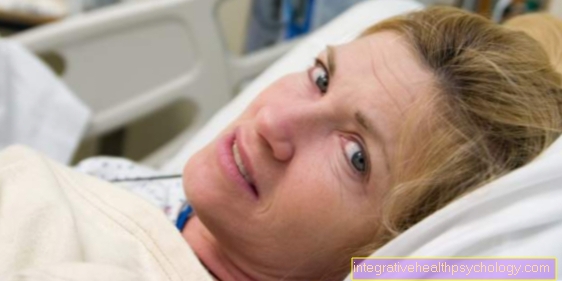
Pre-existing risk factors that can lead to pregnancy complications include:
Age of mother (under 18 years, over 35 years)
Diseases of the mother or within the family, e.g. Diabetes mellitus, high blood pressure, epilepsy, very overweight, Infections
Previous operations, malformations or Fibroids (benign tumors) the uterus
State after one or more Caesarean sections
more than five births in the past and a rapid succession of pregnancies (less than a year between pregnancies)
Complications from previous pregnancies or births, for example Abortions, Miss- or Premature births
Taking medication or drugs
Alcohol or nicotine use
Various risks can arise during pregnancy that require intensive care for both mother and child. These include:
-
Occurrence of anemia (anemia), bleeding, blood group incompatibility (Rhesus factor incompatibility) or thrombosis
-
Incorrect position of the mother cake (Latin placenta, so-called placenta praevia)
-
Cervical weakness (called cervical insufficiency)
-
Reduced blood flow to the placenta with the following undersupply of the child (so-called Placental insufficiency)
-
Infections
-
Gestational diabetes
-
Pregnancy high blood pressure and possibly preeclampsia (pregnancy poisoning), eclampsia and HELLP syndrome (see below)
-
premature labor or rupture of the urine
Another pregnancy complication is the so-called Ectopic pregnancy, also called tubal pregnancy (see below).
Signs or symptoms of a pregnancy complication can include:
severe malaise or malaise (also high fevervomiting, weight loss)
any form of bleeding (including spotting)
Sudden leakage of fluid from the vagina (indication of leakage of amniotic fluid)
Painful urination (Note for urinary tract infection)
Pain in the abdomen, groin, or back
Less or no noticeable child movements throughout the day
a headacheVisual disturbances dizziness
Water retention (so-called edema), especially on the face, hands and legs / feet
very rapid weight gain
In this case, pregnant women should always consult a gynecologist or their treating doctor.
Age
Are women in pregnancy younger than 18 years or older than 35 years (from the second child older than 40 years), pregnancy is called High risk pregnancy classified and pregnancy complications may arise.
Among other things, complications are more common in very young women, such as premature labor and Premature births.
In women over 35 years Chromosome changes such as. Trisomy 21 (Down syndrom) more often and the risk of Miscarriage is higher. Older women are more likely to have pre-existing conditions that can lead to pregnancy complications. It is also more common to develop one in the course of pregnancy Gestational diabetes, Pregnancy hypertension, Thrombosis or placental insufficiency.
frequency
Overall, vaginal bleeding is not uncommon during pregnancy. In early pregnancy, about 20% of all expectant mothers, i.e. about every fifth woman, have bleeding. The cause of the bleeding is often harmless, but it should always be clarified by a doctor.
In the second half of pregnancy (from the 20th week of pregnancy) there is less bleeding overall, only in about 2-10% of cases. However, the causes are usually more serious at this stage than in early pregnancy.
This topic could also be of interest to you: Pubic bone pain in pregnancy
Bleeding
Bleeding is a major complication of pregnancy. Even if bleeding during pregnancy does not necessarily pose a risk to mother and child, the expectant mother should, if weak (e.g. Spotting) or heavy bleeding with or without pain Immediately consult a gynecologist or your treating doctor or drive to the hospital. In particular, bright red (Fresh) and heavy bleeding is an alarm signal and requires immediate medical evaluation.
In the Early pregnancy (first to twelfth week of pregnancy (SSW)) bleeding occurs relatively often. The causes for this can be harmless, such as the so-called Nidation bleeding during the implantation of the fertilized egg in the uterus, which takes place a few days after fertilization or small injuries in the vagina or on the cervix, such as them e.g. through sexual intercourse can arise. But also one Ectopic pregnancy, changing the hormonal balance at the beginning of pregnancy or a Miscarriage can cause bleeding in early pregnancy.
In the later course of pregnancy, bleeding from the Scabbard. The reasons for this can include a misplacement of the Mother cake (so-called placenta previa) or a premature detachment of the placenta from the uterine wall, which is an emergency. The so-called, however, is harmless Drawing bleedingif it occurs a few days around the due date. But even in this case, the expectant mother should consult a doctor.
Pregnancy hypertension
If during pregnancy, as part of preventive examinations at the gynecologist, elevated blood pressure values are found in the pregnant woman (over 140 / 90mmHg), this can have various causes. A harmless reason would be an existing nervousness or excitement when visiting the doctor. In this case the expectant mother should measure and record her blood pressure at home in a familiar environment, or a long-term blood pressure test over 24 hours should be carried out.
However, if there is increased blood pressure, especially from the 20th week of pregnancy, pregnancy hypertension is diagnosed. This can pose a risk to both mother and child. The causes of pregnancy high blood pressure are still partly unknown. Risk factors such as high blood pressure or diabetes mellitus that existed before pregnancy can, however, promote the development of high blood pressure during pregnancy.
Symptoms and complications of pregnancy high blood pressure include:
-
Headache, dizziness, blurred vision
-
Reduced blood flow in the mother cake with subsequent nutrient deficiency in the child
-
Preeclampsia (pregnancy poisoning, precursor to eclampsia): high blood pressure, proteins in the urine and possibly water retention (edema)
-
Eclampsia: symptoms of preeclampsia plus seizures
-
HELLP syndrome: A complication of eclampsia, which can lead to the breakdown of red blood cells (hemolysis), elevated liver enzymes (elevated liver enzymes) and a reduction in blood platelets (low platelet count).
The treatment of high blood pressure in pregnancy includes close monitoring of blood pressure, urine and blood values, a balanced diet and sufficient exercise. Treatment with antihypertensive drugs may be necessary.
Preeclampsia and eclampsia can be very dangerous for both mother and child, so giving birth should be sought as soon as possible. If the HELLP syndrome occurs, the delivery must be carried out immediately.
Find out more here: Lowering blood pressure during pregnancy
Ectopic pregnancy
The Ectopic pregnancy is the most common form of extrauterine pregnancy, i.e. implantation of the fertilized Egg cell except for uterus and makes a important pregnancy complication The fertilized egg nests in one on its way to the uterus Fallopian tubes a. This can lead to injuries or even rupture of the affected fallopian tube and so to complications Abdominal pain and cause profuse bleeding that can be life threatening. An ectopic pregnancy can be caused by a pregnancy test, a gynecological examination and a Ultrasound examination to be established. Depending on the stage of the ectopic pregnancy, there are different therapy options. In the early stages, an ectopic pregnancy can be treated with medication; in advanced stages, surgery is often necessary.



.jpg)



